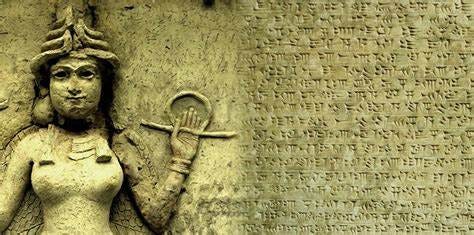Inanna’s Return from the Underworld is perhaps the most ancient Resurrection Myth in human history, going back perhaps to the 3rd millennium BCE. It is a first attempt at understanding Nature’s cycles, which the Sumerians typically tended to interpret in terms of actions of supernatural beings. Which is, after all, not so different from our reliance on “natural laws,” while the idea of the divinity returning from death is maintaining in the Christian myth of Resurrection. Here is an excerpt from “The Descent of Inanna” in the translation by Samuel Noah Kramer. The full text can be found here.
From the Great Above she opened her ear to the Great Below.
From the Great Above the goddess opened her ear to the Great Below.
From the Great Above Inanna opened her ear to the Great Below.
My Lady abandoned heaven and earth to descend to the underworld.
Inanna abandoned heaven and earth to descend to the underworld.
She abandoned her office of holy priestess to descend to the underworld
She placed the shugurra, the crown of the steppe, on her head.
She arranged the dark locks of hair across her forehead.
She tied the small lapis beads around her neck,
Let the double strand of beads fall to her breast,
And wrapped the royal robe around her body.
When Inanna arrived at the outer gates of the underworld,
She knocked loudly.
She cried out in a fierce voice:
"Open the door, gatekeeper!
Open the door, Neti!
I alone would enter!"
Neti, the chief gatekeeper of the kur, asked:
"Who are you?"
She answered:
"I am Inanna, Queen of Heaven,
On my way to the East."
Naked and bowed low, Inanna entered the throne room.
Ereshkigal rose from her throne.
Inanna started toward the throne.
The Annuna, the judges of the underworld, surrounded her.
They passed judgment against her.
Then Ereshkigal fastened on Inanna the eye of death.
She spoke against her the word of wrath.
She uttered against her the cry of guilt.
She struck her.
Inanna was turned into a corpse,
A piece of rotting meat,
And was hung from a hook on the wall.
The kurgarra sprinkled the food of life on the corpse.
The galatur sprinkled the water of life on the corpse.
Inanna arose. . . .





🐇🥚🐇🥚🐇🥚🐇🥚 ...